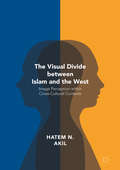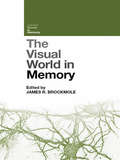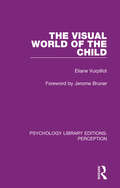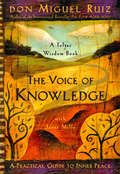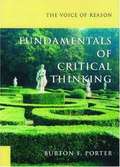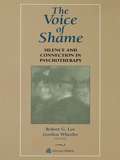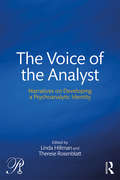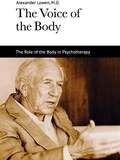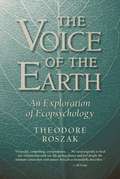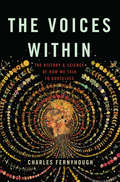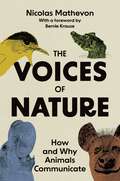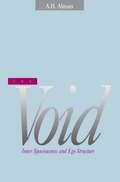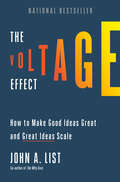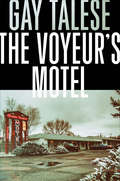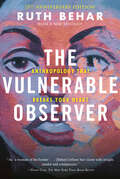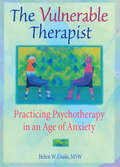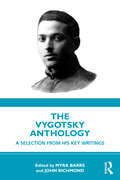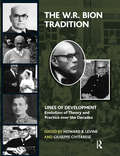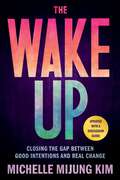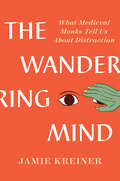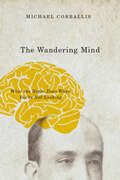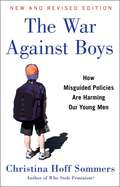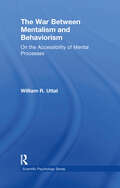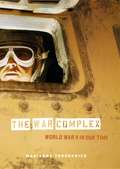- Table View
- List View
The Visual Divide between Islam and the West
by Hatem N. AkilThis book considers the ways in which Muslims view the way they are being viewed, not viewed, or incorrectly viewed, by the West. The book underscores a certain "will-to-visibility" whereby Muslims/ Arabs wish just to be "seen" and to be marked as fellow human beings. The author relates the failure to achieve this visibility to a state of desperation that inextricably and symmetrically ties visibility to violence. When Syrian and Palestinian refugees recently started refusing to be photographed, they clearly ushered the eventual but inevitable collapse of the image and its final futility. The photograph has been completely emptied of its last remaining possibility of signification. The book attempts to engage with questions about the ways in which images are perceived within cross cultural contexts. Why and how do people from different cultural backgrounds view the same image in opposing ways; why do cartoon, photographs, and videos become both the cause and target of bloody political violence - as witnessed recently by the deadly attacks against Charlie Hebdo in France and in the swift military response by the US, Jordan, France, and others to videotaped violence by ISIS.
The Visual World in Memory (Current Issues in Memory)
by James R. BrockmoleThe book examines how well we remember what we see. Research in human memory for visual material varies tremendously across the time scales, stimuli, and scenarios of interest. Because of these distinct pursuits, research in the field of 'visual memory' is in practice rather compartmentalized and as such is disseminated across a range of literatures. The Visual World in Memory pulls together this disparate field with a series of chapters, each written by a leading expert, that concisely present the state-of-the-science in all the areas of research. The result is a single source of information that bridges the divides that separate the field as a whole. Each chapter reviews and analyzes current theories and controversies regarding such issues as visual and spatial working memory, memory for visual features, conjunctions, objects, and locations, memory for faces, memory for real-world scenes, memory for visual events, the role of visual memory in motor planning and action, the relationship between visual memory, reference frames, and navigation, and visual imagery. The rigorous discussion and analysis included in each chapter will appeal to established researchers and vision scientists whilst the breadth of the book will make it an ideal companion for students learning about memory.
The Visual World of the Child (Psychology Library Editions: Perception #31)
by Eliane Vurpillot‘How do children see the world?’ is a question of immense importance which fascinates not only psychologists but also parents and all those concerned with education. In this English translation, first published in 1976, the author, who was Professor of Psychology at the René Descartes University in Paris, provided the most comprehensive review at the time of the development of visual perception in children, a field to which she herself had made a substantial contribution. Her book, which gave the first comprehensive study of the relationship between cognitive development and perceptual activities in small children, explores how they interpret visual information and gradually build up a picture of the world. The author had devoted fifteen years to research on the visual world of the child and possessed an exhaustive knowledge of the experimental literature on the subject in English, French, Russian and other languages. She saw perception as a form of knowledge which the child exploits and adapts in a variety of ways at different stages of development. This is brilliantly demonstrated in her own research on the strategies children use in judging things as ‘different’ or ‘the same’ and the way these relate to the structure of their perceptual organisation. This book is essential reading for anyone with a serious interest in developmental and cognitive psychology; it also provides an object lesson in the application of experimental methods. In addition the organisation of the material made it a valuable textbook for advanced undergraduate and post-graduate teaching and will still be of interest in its historical context today.
The Voice of Knowledge: A Practical Guide to Inner Peace (A Toltec Wisdom Book)
by Don Miguel Ruiz Janet MillsFrom the bestselling author of The Four AgreementsIn The Voice of Knowledge, Miguel Ruiz reminds us of a profound and simple truth: The only way to end our emotional suffering and restore our joy in living is to stop believing in lies — mainly about ourselves. Based on ancient Toltec wisdom, this breakthrough book shows us how to recover our faith in the truth and return to our own common sense. Ruiz changes the way we perceive ourselves, and the way we perceive other people. Then he opens the door to a reality that we once perceived when we were one and two years old — a reality of truth, love, and joy."We are born in truth, but we grow up believing in lies. . . . One of the biggest lies in the story of humanity is the lie of our imperfection." — don Miguel Ruiz
The Voice of Reason: Fundamentals of Critical Thinking
by Burton F. PorterLively, comprehensive, and contemporary, The Voice of Reason: Fundamentals of Critical Thinking covers three principal areas: thought and language, systematic reasoning, and modes of proof. It employs highly accessible explanations and a multitude of examples drawn from social issues and various academic fields, showing students and other readers how to construct and criticize arguments using the techniques of sound reasoning. The Voice of Reason examines the traditional elements of the field and also explores new ground. The first section of the book elucidates the relationship between thought and language, explaining how words function. It discusses meaning, connotation, vagueness, ambiguity, and definition, identifying the linguistic elements that can produce mistakes in thinking. The next section describes the rules of systematic reasoning, examining such topics as truth, relevance, and adequacy; deductive logic (categorical, hypothetical, and disjunctive); and induction (cause and effect, analogy, generalization, and hypothesis). Sixteen fallacies in thinking are also described through extensive illustrations and applications. The final section of the book offers a unique study of what constitutes proof in several different areas--including politics, advertising, law, and social issues--as well as in the academic disciplines of literature, science, history, and ethics. The author describes the various rules of evidence, using essays by major figures in each field as examples. An ideal text for courses in critical thinking, informal logic, and reasoning and writing, The Voice of Reason offers numerous pedagogical features including a host of examples; assignments, exercises, and puzzles at both the halfway point and at the end of each chapter; cartoons and quotations throughout; and practical applications of theoretical concepts.
The Voice of Shame: Silence and Connection in Psychotherapy
by Robert G. Lee Gordon WheelerShame and shame reactions are two of the most delicate and difficult issues of psychotherapy and are among the most likely to defy our usual dynamic, systemic, and behavioral theories. In this groundbreaking new collection, The Voice of Shame, thirteen distinguished authors show how use of the Gestalt model of self and relationship can clarify the dynamics of shame and lead us to fresh approaches and methods in this challenging terrain. This model shows how shame issues become pivotal in therapeutic and other relationships and how healing shame is the key to transformational change. The contributors show how new perspectives on shame gained in no particular area transfer and generalize to other areas and settings. In so doing, they transform our fundamental understanding of psychotherapy itself. Grounded in the most recent research on the dynamics and experience of shame, this book is a practical guide for all psychotherapists, psychologists, clinicians, and others interested in self, psychotherapy, and relationship. This book contains powerful new insights for the therapist on a full-range of topics from intimacy in couples to fathering to politics to child development to gender issues to negative therapeutic reactions. Filled with anecdotes and case examples as well as practical strategies, The Voice of Shame will transform your ideas about the role of shame in relationships - and about the potential of the Gestalt model to clarify and contextualize other approaches.
The Voice of the Analyst: Narratives on Developing a Psychoanalytic Identity (Psychoanalysis in a New Key Book Series)
by Linda Hillman Therese RosenblattThe Voice of the Analyst contains personal narratives by twelve psychoanalysts, each taking the reader through his or her unique path toward developing a voice and identity as an analyst. All come from different backgrounds, theoretical orientations and stages of their careers. The narratives are courageous and uncommonly revealing in a profession that demands so much reserve and anonymity from its practitioners. This book demonstrates that the analyst’s work is a product of their characters as well as training and theory. The narrative form in this book offers a refreshing and necessary companion to the theoretical and clinical writing that dominates the field. The editors show the importance of developing a unique voice and identity if one is to function well as an analyst. This endeavor cannot be accomplished solely through technical training, especially with the isolation that characterizes clinical practice. There are pressures that analysts experience alone in their practice, from patients and themselves as well as other professionals, forces that render technical training and theory alone inadequate in facilitating the development of one’s analytic voice and identity. Enter the form of the personal narrative presented in this book. This fascinating compilation of narratives shows how the contributors bear striking similarities and differences to one another. Despite their different backgrounds, they display commonality in their sensitivity towards mental and emotional states and their wish to heal suffering. However, they also exemplify wide differences in motivations, interests and what makes them tick as psychoanalysts. The Voice of the Analyst will be a great companion book for established psychoanalysts and psychoanalytic psychotherapists and those in training, as well as mental health professionals keen to understand what it takes to become a psychoanalyst and to enhance their personal and professional development.
The Voice of the Body
by Alexander LowenThe Voice of the Body is the first publication in a single volume of Alexander Lowen's public lectures known as The Lowen Monographs.This historical collection of twenty-two lectures by one of the founders of contemporary body psychotherapy embodies the groundbreaking principles of Bioenergetics and Bioenergetic Analysis. Presented between 1962 and 1982, these lectures document the depth and breadth of Lowen's work not otherwise detailed in his published work. Poignant and relevant to the challenges of today's world, the topics include: Stress and Illness: A Bioenergetic View; Breathing, Movement and Feeling; Thinking and Feeling: The Bioenergetic Analysis of Thought; Sex and Personality; Self Expression vs. Survival; Aggression and Violence in the Individual; and Psychopathic Behavior and the Psychopathic Personality.
The Voice of the Earth an Exploration of Ecopsychology (2nd Edition)
by Theodore RoszakExamining perspectives on the connection between man's inner being and the outer world, this title covers topics such as the Anthropic Principle, Gaia Hypothesis, mysticism, religion, nature, and more.
The Voices Within: The History and Science of How We Talk to Ourselves
by Charles FernyhoughA luminous exploration of the nature of thoughts, from daydreams to the voices in our headsAt the moment you caught sight of this book, what were you thinking? Was your thought a stream of sensations? Or was it a voice in your head? Did you ask yourself, "I wonder what that's about?" Did you answer? And what does it mean if you did?When someone says they hear voices in their head, they are often thought to be mentally ill. But, as Charles Fernyhough argues in The Voices Within, such voices are better understood as one of the chief hallmarks of human thought. Our inner voices can be self-assured, funny, profound, hesitant, or mean; they can appear in different accents and even in sign language. We all hear them-and we needn't fear them. Indeed, we cannot live without them: we need them, whether to make decisions or to bring a book's characters to life as we read. Studying them can enrich our understanding of ourselves, and our understanding of the world around us; it can help us understand the experiences of visionary saints, who might otherwise be dismissed as schizophrenics; to alleviate the suffering of those who do have mental health problems; and to understand why the person next to us on the subway just burst out laughing for no apparent reason.Whether the voices in our heads are meandering lazily or clashing chaotically, they deserve to be heard. Bustling with insights from literature, film, art, and psychology, The Voices Within offers more than science; it powerfully entreats us all to take some time to hear ourselves think.
The Voices of Nature: How and Why Animals Communicate
by Nicolas MathevonSongs, barks, roars, hoots, squeals, and growls: exploring the mysteries of how animals communicate by soundWhat is the meaning of a bird’s song, a baboon’s bark, an owl’s hoot, or a dolphin’s clicks? In The Voices of Nature, Nicolas Mathevon explores the mysteries of animal sound. Putting readers in the middle of animal soundscapes that range from the steamy heat of the Amazon jungle to the icy terrain of the Arctic, Mathevon reveals the amazing variety of animal vocalizations. He describes how animals use sound to express emotion, to choose a mate, to trick others, to mark their territory, to call for help, and much more. What may seem like random chirps, squawks, and cries are actually signals that, like our human words, allow animals to carry on conversations with others.Mathevon explains how the science of bioacoustics works to decipher the ways animals make and hear sounds, what information is encoded in these sound signals, and what this information is used for in daily life. Drawing on these findings as well as observations in the wild, Mathevon describes, among many other things, how animals communicate with their offspring, how they exchange information despite ambient noise, how sound travels underwater, how birds and mammals learn to vocalize, and even how animals express emotion though sound. Finally, Mathevon asks if these vocalizations, complex and expressive as they are, amount to language.For readers who have wondered about the meaning behind a robin’s song or cicadas’ relentless “tchik-tchik-tchik,” this book offers a listening guide for the endlessly varied concert of nature.
The Void: Inner Spaciousness and Ego Structure
by A. H. AlmaasIn this book Almaas brings together concepts and experiences drawn from contemporary object relations theory, Freudian-based ego psychology, case studies from his own spiritual practice, and teaching from the highest levels of Buddhist and other Eastern practices. He challenges us to look not only at the personality and the content of the mind, but also at the underlying nature of the mind itself.
The Voltage Effect: How to Make Good Ideas Great and Great Ideas Scale
by John A. ListA leading economist answers one of today&’s trickiest questions: Why do some great ideas make it big while others fail to take off? &“Brilliant, practical, and grounded in the very latest research, this is by far the best book I&’ve ever read on the how and why of scaling.&”—Angela Duckworth, CEO of Character Lab and New York Times bestselling author of GritONE OF THE MOST ANTICIPATED BOOKS OF 2022—Men&’s Journal&“Scale&” has become a favored buzzword in the startup world. But scale isn't just about accumulating more users or capturing more market share. It's about whether an idea that takes hold in a small group can do the same in a much larger one—whether you&’re growing a small business, rolling out a diversity and inclusion program, or delivering billions of doses of a vaccine. Translating an idea into widespread impact, says University of Chicago economist John A. List, depends on one thing only: whether it can achieve &“high voltage&”—the ability to be replicated at scale. In The Voltage Effect, List explains that scalable ideas share a common set of attributes, while any number of attributes can doom an unscalable idea. Drawing on his original research, as well as fascinating examples from the realms of business, policymaking, education, and public health, he identifies five measurable vital signs that a scalable idea must possess, and offers proven strategies for avoiding voltage drops and engineering voltage gains. You&’ll learn: • How celebrity chef Jamie Oliver expanded his restaurant empire by focusing on scalable &“ingredients&” (until it collapsed because talent doesn&’t scale) • Why the failure to detect false positives early on caused the Reagan-era drug-prevention program to backfire at scale • How governments could deliver more services to more citizens if they focused on the last dollar spent • How one education center leveraged positive spillovers to narrow the achievement gap across the entire community • Why the right set of incentives, applied at scale, can boost voter turnout, increase clean energy use, encourage patients to consistently take their prescribed medication, and more. By understanding the science of scaling, we can drive change in our schools, workplaces, communities, and society at large. Because a better world can only be built at scale.
The Voyeur's Motel (Books That Changed the World)
by Gay TaleseThe controversial chronicle of a motel owner who secretly studied the sex lives of his guests by the renowned journalist and author of Thy Neighbor’s Wife.On January 7, 1980, in the run-up to the publication of his landmark bestseller Thy Neighbor’s Wife, Gay Talese received an anonymous letter from a man in Colorado. “Since learning of your long-awaited study of coast-to-coast sex in America,” the letter began, “I feel I have important information that I could contribute to its contents or to contents of a future book.” The man—Gerald Foos—hen divulged an astonishing secret: he had bought a motel outside Denver for the express purpose of satisfying his voyeuristic desires. Underneath its peaked roof, he had built an “observation platform” through which he could peer down on his unwitting guests.Over the years, Foos sent Talese hundreds of pages of notes on his guests, work that Foos believed made him a pioneering researcher into American society and sexuality. Through his Voyeur’s motel, he witnessed and recorded the harsh effects of the war in Vietnam, the upheaval in gender roles, the decline of segregation, and much more. In The Voyeur’s Motel. “the reader observes Talese observing Foos observing his guests.” An extraordinary work of narrative journalism, it is at once an examination of one unsettling man and a portrait of the secret life of the American heartland over the latter half of the twentieth century (Daily Mail, UK).“This is a weird book about weird people doing weird things, and I wouldn’t have put it down if the house were on fire.” —John Greenya, Washington Times
The Vulnerable Observer: Anthropology That Breaks Your Heart
by Ruth BeharEloquently interweaving ethnography and memoir, award-winning anthropologist Ruth Behar offers a new theory and practice for humanistic anthropology. She proposes an anthropology that is lived and written in a personal voice. She does so in the hope that it will lead us toward greater depth of understanding and feeling, not only in contemporary anthropology, but in all acts of witnessing.
The Vulnerable Therapist: Practicing Psychotherapy in an Age of Anxiety
by Helen W. CoaleA passionate, proactive stance on the present state of psychotherapy, The Vulnerable Therapist: Practicing Psychotherapy in an Age of Anxiety picks the brains of contemporary mental health professionals and finds a common symptom--fear. You’ll see why litigation, market forces, and ethical confusion have raised a dark umbrella of angst over psychotherapy practices and discover what therapists can do to restore the profession to its former good self.The Vulnerable Therapist will capture your interest with its broad systemic approach, contextual analysis, fascinating case studies, and anecdotal material. You’ll see the need for improvement at the institutional and individual levels of the psychotherapy professions. Specifically, you’ll read about: social, cultural, and contextual aspects of the crisis of meaning in psychotherapy professional responses to the crisis of meaning which create ethical dilemmas for individual practitioners the power of language to construct and control mental health beliefs psychotherapy’s core constructs and ethical “buzzwords” psychological and legal risks in practicing psychotherapy today specific problems with licensing boards and other complaint channels problems with rule-based ethics alternative models for creating ethical therapist-client relationships Today, more and more, excessive litigation and market-driven forces are imposing standard ethics decisions on psychotherapists, forcing them to see their clients through the clouded lenses of risk management and liability instead of through the lens of therapeutic need. Much like the symptomatic children whose dysfunctional family stops blaming them and starts shouldering part of the “problem,” distraught therapists need the psychotherapy profession to address its own psychopathology at the institutional level. The Vulnerable Therapist shows how you can contribute to a total revamping of the mental health professions in a way that facilitates rather than impedes ethical functioning.
The Vygotsky Anthology: A Selection from His Key Writings
by Myra Barrs John RichmondThe Vygotsky Anthology brings together, for the first time, a selection of extracts from the best translations available of Vygotsky’s writings, spanning the entire arc of his career.Vygotsky was arguably one of the greatest educational psychologists of the 20th century. Grounded in his experience as a teacher, an expert in special education, a research psychologist and an outstanding theorist, the editors of this unique anthology chart his enormous influence on professionals working in education and child development around the world. The extracts are introduced by the editors’ commentaries, helpfully setting them in the context of Vygotsky’s life and work, providing a collection of work that adequately represents his writing, and conveying some of the great pleasures of reading him. In the passages selected here, his voice is clearly heard, the intellectual brilliance of his insights is reflected, his line of argument is clear, and his humour and humanity are evident.With its inclusion of recent translations of essential texts, this anthology will help students to understand the full diversity of Vygotsky’s influence on today’s classrooms. Seen as a companion volume to Myra Barrs’ previous work Vygotsky the Teacher (Routledge, 2022), the value of this text to teachers, educational psychologists, and other practitioners working in the field of education and child development will be significant and lasting. It is a key reference book for new generations of Vygotsky students.
The W.R. Bion Tradition (The\lines Of Development - Evolution And Theory And Practice Over The Decades Ser.)
by Giuseppe CivitareseThis book engages a truly international group of distinguished Bion scholars, offering a wide variety of contemporary clinical and theoretical explorations and extensions of the seminal work of Wilfred Bion. Readers will discover personal accounts of contacts with Bion and his ideas, including an extensive report of an analysis with Bion, as well as previously unpublished supervisions that Bion conducted in Brazil in the 1970s, with commentaries by contemporary analysts. The book also includes detailed case reports and theoretical discussions on a wide variety of topics including autism, psychosomatics, representation, field theory, psychosis and truth; and essays on Sense, Myth and Passion, the late papers, groups and aesthetics.For both experienced analysts and candidates, for those already familiar with Bion and for neophytes, The Bion Tradition should serve as an essential and up-to-date resource for study, thought and exploration.
The Wake Up: Closing the Gap Between Good Intentions and Real Change
by Michelle MiJung KimWaking Up to Our Capacity to Transform Ourselves and the World As we become more aware of various social injustices in the world, many of us want to be part of the movement toward positive change. But sometimes our best intentions cause unintended harm, and we fumble. We might feel afraid to say the wrong thing and feel guilt for not doing or knowing enough. Sometimes we might engage in performative allyship rather than thoughtful solidarity, leaving those already marginalized further burdened and exhausted. The feelings of fear, insecurity, inadequacy are all too common among a wide spectrum of changemakers, and they put many at a crossroads between feeling stuck and giving up, or staying grounded to keep going. So how can we go beyond performative allyship to creating real change in ourselves and in the world, together? In The Wake Up, Michelle MiJung Kim shares foundational principles often missing in today&’s mainstream conversations around &“diversity and inclusion,&” inviting readers to deep dive into the challenging and nuanced work of pursuing equity and justice, while exploring various complexities, contradictions, and conflicts inherent in our imperfect world. With a mix of in-the-trenches narrative and accessible unpacking of hot button issues—from inclusive language to representation to "cancel culture"—Michelle offers sustainable frameworks that guide us how to think, approach, and be in the journey as thoughtfully and powerfully as possible. The Wake Up is divided into four key parts: Grounding: begin by moving beyond good intentions to interrogating our deeper &“why&” for committing to social justice and uncovering our "hidden stories."Orienting: establish a shared understanding around our historical and current context and issues we are trying to solve, starting with dismantling white supremacy.Showing Up: learn critical principles to approach any situation with clarity and build our capacity to work through complexity, nuance, conflict, and imperfections.Moving Together: remember the core of this work is about human lives, and commit to prioritizing humanity, healing, and community. The Wake Up is an urgent call for us to move together while seeing each other&’s full and expansive humanity that is at the core of our movement toward justice, healing, and freedom.
The Wandering Mind: What Medieval Monks Tell Us About Distraction
by Jamie KreinerA revelatory account of how Christian monks identified distraction as a fundamental challenge—and how their efforts to defeat it can inform ours, more than a millennium later. The digital era is beset by distraction, and it feels like things are only getting worse. At times like these, the distant past beckons as a golden age of attention. We fantasize about escaping our screens. We dream of recapturing the quiet of a world with less noise. We imagine retreating into solitude and singlemindedness, almost like latter-day monks. But although we think of early monks as master concentrators, a life of mindfulness did not, in fact, come to them easily. As historian Jamie Kreiner demonstrates in The Wandering Mind, their attempts to stretch the mind out to God—to continuously contemplate the divine order and its ethical requirements—were all-consuming, and their battles against distraction were never-ending. Delving into the experiences of early Christian monks living in the Middle East, around the Mediterranean, and throughout Europe from 300 to 900 CE, Kreiner shows that these men and women were obsessed with distraction in ways that seem remarkably modern. At the same time, she suggests that our own obsession is remarkably medieval. Ancient Greek and Roman intellectuals had sometimes complained about distraction, but it was early Christian monks who waged an all-out war against it. The stakes could not have been higher: they saw distraction as a matter of life and death. Even though the world today is vastly different from the world of the early Middle Ages, we can still learn something about our own distractedness by looking closely at monks’ strenuous efforts to concentrate. Drawing on a trove of sources that the monks left behind, Kreiner reconstructs the techniques they devised in their lifelong quest to master their minds—from regimented work schedules and elaborative metacognitive exercises to physical regimens for hygiene, sleep, sex, and diet. She captures the fleeting moments of pure attentiveness that some monks managed to grasp, and the many times when monks struggled and failed and went back to the drawing board. Blending history and psychology, The Wandering Mind is a witty, illuminating account of human fallibility and ingenuity that bridges a distant era and our own.
The Wandering Mind: What the Brain Does When You're Not Looking
by Michael CorballisRooted in neuroscience, psychology and evolutionary biology, this study explores what happens when we stop paying attention and the effect on our behavior.If we’ve done our job well—and, let’s be honest, if we’re lucky—you’ll read to the end of this description. Most likely, however, you won’t. Somewhere in the middle of the next paragraph, your mind will wander off. Minds wander. That’s just how it is.That may be bad news for me, but is it bad news for people in general? Does the fact that as much as fifty percent of our waking hours find us failing to focus on the task at hand represent a problem? Michael Corballis doesn’t think so. With The Wandering Mind, he shows us why, rehabilitating woolgathering and revealing its incredibly useful effects. Drawing on the latest research from cognitive science and evolutionary biology, Corballis shows us how mind-wandering not only frees us from moment-to-moment drudgery, but also from the limitations of our immediate selves. Mind-wandering strengthens our imagination, fueling the flights of invention, storytelling, and empathy that underlie our shared humanity; furthermore, he explains, our tendency to wander back and forth through the timeline of our lives is fundamental to our very sense of ourselves as coherent, continuing personalities.Full of unusual examples and surprising discoveries, The Wandering Mind mounts a vigorous defense of inattention—even as it never fails to hold the reader’s.Praise for The Wandering Mind“[A] conversational, sincere and amusing book about the tendency of our minds to stray from whatever it is we are actually supposed to be focusing on. . . . [An] engaging exploration of the subject.” —Times Higher Education, Book of the Week“Michael Corballis, the scientist, takes you by the hand and weaves through an avalanche of information from psychology, literature, history, and more to elucidate my favorite mental state—mind wandering. His high capacity for erudition, lucidity, and warmth have never shined more brightly.” —Michael S. Gazzaniga“The Wandering Mind is a pleasure to read—a lively book that will appeal to a broad spectrum of readers.” —Thomas Suddendorf, author of The Gap
The War Against Boys: How Misguided Policies are Harming Our Young Men
by Christina Hoff SommersAn updated and revised edition of the controversial classic—now more relevant than ever—argues that boys are the ones languishing socially and academically, resulting in staggering social and economic costs.Girls and women were once second-class citizens in the nation&’s schools. Americans responded with concerted efforts to give girls and women the attention and assistance that was long overdue. Now, after two major waves of feminism and decades of policy reform, women have made massive strides in education. Today they outperform men in nearly every measure of social, academic, and vocational well-being. Christina Hoff Sommers contends that it&’s time to take a hard look at present-day realities and recognize that boys need help. Called &“provocative and controversial...impassioned and articulate&” (The Christian Science Monitor), this edition of The War Against Boys offers a new preface and six radically revised chapters, plus updates on the current status of boys throughout the book. Sommers argues that the problem of male underachievement is persistent and worsening. Among the new topics Sommers tackles: how the war against boys is harming our economic future, and how boy-averse trends such as the decline of recess and zero-tolerance disciplinary policies have turned our schools into hostile environments for boys. As our schools become more feelings-centered, risk-averse, competition-free, and sedentary, they move further and further from the characteristic needs of boys. She offers realistic, achievable solutions to these problems that include boy-friendly pedagogy, character and vocational education, and the choice of single-sex classrooms. The War Against Boys is an incisive, rigorous, and heartfelt argument in favor of recognizing and confronting a new reality: boys are languishing in education and the price of continued neglect is economically and socially prohibitive.
The War Between Mentalism and Behaviorism: On the Accessibility of Mental Processes (Scientific Psychology Series)
by William R. UttalThis book considers one of the most fundamental, but only infrequently considered, issues in psychology--Are mental processes accessible by means of verbal reports and/or experimental assays? It is argues that this is the main characteristic distinguishing between behaviorism and mentalistic cognitivism. The answer posed by the author is that, with few exceptions and for the most fundamental reasons, mental processes are not accessible and that any psychology, such as contemporary cognitivism, based on a putative analysis of mind into its mental components must be fallacious. Classic and modern arguments against both mentalism and behaviorism are reviewed. In general, it is concluded that most antibehaviorist arguments are based on second order humanistic considerations rather than those underlying the usual scientific standards. Behaviorism represents the best that can be done in a situation of fundamental immeasurability and uncertainty. A modern version is offered in the final chapter of this book.
The War Complex: World War II in Our Time
by Marianna TorgovnickThe recent dedication of the World War II memorial and the sixtieth anniversary commemoration of D-Day remind us of the hold that World War II still has over America's sense of itself. But the selective process of memory has radically shaped our picture of the conflict. Why else, for instance, was a 1995 Smithsonian exhibition on Hiroshima that was to include photographs of the first atomic bomb victims, along with their testimonials, considered so controversial? And why do we so readily remember the civilian bombings of Britain but not those of Dresden, Hamburg, and Tokyo? Marianna Torgovnick argues that we have lived, since the end of World War II, under the power of a war complex--a set of repressed ideas and impulses that stems from our unresolved attitudes toward the technological acceleration of mass death. This complex has led to gaps and hesitations in public discourse about atrocities committed during the war itself. And it remains an enduring wartime consciousness, one most recently animated on September 11, 2001. Showing how different events from World War II became prominent in American cultural memory while others go forgotten or remain hidden in plain sight, "The War Complex" moves deftly from war films and historical works to television specials and popular magazines to define the image and influence of World War II in our time. Torgovnick also explores the 1961 trial of Adolf Eichmann, the emotional legacy of the Holocaust, and the treatment of World War II's missing history by writers such as W. G. Sebald to reveal the unease we feel at our dependence on those who hold the power of total war. Thinking anew, then, about how we account for war to each other andourselves, Torgovnick ultimately, and movingly, shows how these anxieties and fears have prepared us to think about 9/11 and our current war in Iraq.
The War Inside
by Michal ShapiraThe War Inside is a groundbreaking history of the contribution of British psychoanalysis to the making of social democracy, childhood, and the family during World War II and the postwar reconstruction. Psychoanalysts informed understandings not only of individuals, but also of broader political questions. By asserting a link between a real 'war outside' and an emotional 'war inside', psychoanalysts contributed to an increased state responsibility for citizens' mental health. They made understanding children and the mother-child relationship key to the successful creation of a democratic citizenry. Using rich archival sources, the book revises the common view of psychoanalysis as an elite discipline by taking it out of the clinic and into the war nursery, the juvenile court, the state welfare committee, and the children's hospital. It traces the work of the second generation of psychoanalysts after Freud in response to total war and explores its broad postwar effects on British society.
